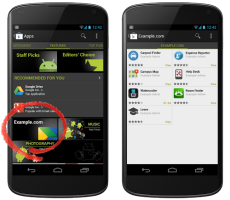Google launches private Android app stores

![]() Google's Private Channels appear on the user's Google Play app.
Google's Private Channels appear on the user's Google Play app.
Source: Google
Google's new "Google Play Private Channel for Google Apps" is the search and advertising company's new offering for companies that want to be able to control the distribution of their internal apps for Android devices. The idea is that a company that already subscribes to Google's Apps for Business subscription plans can create a private Google Play channel, which provides access to the channel's apps only to App users in the same domain. And even then, the administrator has control of which apps are available at a user and group level.
Google suggests, for example, that the Private Channel system would make it easy for companies to internally distribute custom expense reporting apps or conference room finders. To download applications, users can use the Google Play app, select Apps and then the name of the organisation they are signed up for. The system also allows users to publish apps to the private channel; users first need to sign up as regular Google Play apps publishers, which costs $25, and then the administrator can give them private channel publication.
According to Google, the private channel system has all the features of Google Play; user authentication, virus and malware detection, device targeting, payment and user rating, and feedback of applications are supported. Private Channel apps do not appear on the web interface for Google Play and an app cannot appear in public and private channels at the same time, though apps can be moved to a private channel by simply changing its "Restrict Availability" setting.
Rather than being an overt method of securing Android applications, the Private Channel is more of a way of offering a reasonably secured and controlled way of distributing corporate applications to a company's users, rather than expecting them to download applications from a web site and enabling the "allow third party apps" settings; although the apps would run, enabling third party apps could allow unchecked malware to be downloaded as well as legitimate software.
(djwm)








![Kernel Log: Coming in 3.10 (Part 3) [--] Infrastructure](/imgs/43/1/0/4/2/6/7/2/comingin310_4_kicker-4977194bfb0de0d7.png)

![Kernel Log: Coming in 3.10 (Part 3) [--] Infrastructure](/imgs/43/1/0/4/2/3/2/3/comingin310_3_kicker-151cd7b9e9660f05.png)








